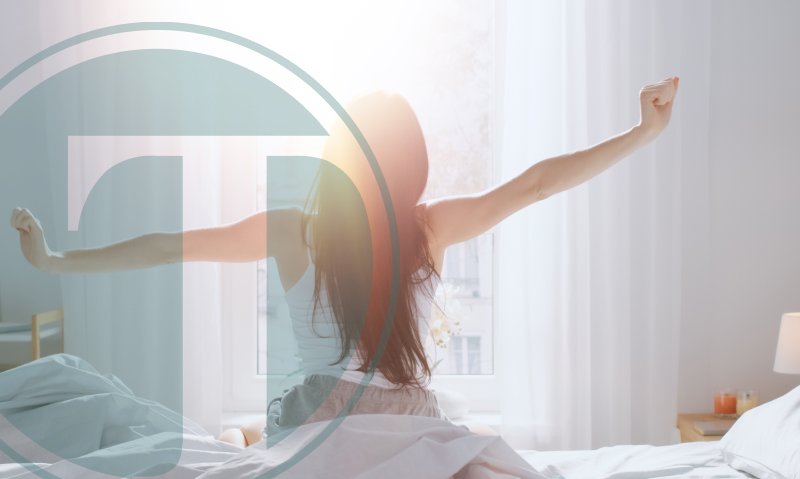Yes, You Can Wake Up Feeling Energized and Refreshed

Improve Your Quality of Sleep
The alarm beeps, and you reluctantly drag yourself out of bed. You rely on coffee or energy drinks to shake off the grogginess but still experience daytime fatigue or an afternoon crash. You regularly get 8 hours of sleep every night yet never feel rested.
We all know adults should get between seven and nine hours of sleep every night, but that’s a simplistic take on sleep. The truth is you need to get quality, deep sleep on a nightly basis. Although many factors can impact your sleep quality, undiagnosed sleep apnea is a frequent cause.
Let’s talk more about deep sleep, the effects of sleep apnea, and how we can help you get relief.
What Is Deep Sleep and Why Is It Important?
Sleep has four different stages which repeat throughout the night.
In the first 10 minutes of falling asleep, you’re in stage N1. As your body and brain relax further, you enter stage N2, which is characterized by slow delta wave brain activity that lasts for half an hour to an hour. The next stage is N3, the phase of sleep we refer to as “deep sleep,” which most people remain in for about 20 to 40 minutes.
When you’re in deep sleep your delta waves increase, but your body might still move. You begin to start dreaming in the final stage called REM or rapid eye movement. When you’re in the REM phase you’re in the deepest sleep, dreaming, and your body is immobile until you wake up.
Achieving deep sleep and REM is absolutely essential for your health. In the deep sleep stage your brain and body are basically restoring themselves, whether it be through memory development, growth hormone secretion, or balancing chemicals within the brain. The only way for your body and brain to fully reset is through deep sleep and REM.
How Does Sleep Apnea Impact Sleep Quality?
Sleep apnea is a form of sleep-disordered breathing that prevents people from achieving deep sleep and REM.
There are three different types of sleep apnea—obstructive (OSA), central (CSA), and complex, which is when OSA and CSA present simultaneously. OSA is the most common form of sleep apnea, so we’ll be focusing on this type.
The obstruction in OSA disorders happens when the soft tissues in the mouth and throat fall backward into the throat while sleeping. This blocks the airway, often causing snoring, and either makes breathing very difficult or temporarily stops breathing altogether. OSA most often strikes during deep sleep and REM because your body is at its most relaxed.
Just as you reach deep sleep, your airway becomes blocked and you experience something called an “arousal.” Your body basically pulls itself from deep sleep, but not so far that you actually wake up. People with OSA can experience literally hundreds of arousals in their sleep pattern in a single night—and often not even realize it’s happening.
When OSA is left untreated you wind up suffering from classic side effects of sleep deprivation, including:
- Chronic fatigue and daytime sleepiness
- Forgetfulness and poor memory recall
- Irritability, anxiety, and general mood swings
- Increased feelings of depression or sadness
- Daily headaches, particularly in the morning
- High blood pressure and increased risk of heart disease
- Increased risk of diabetes and other systemic diseases
OSA and other types of sleep apnea can also occur alongside other oral-related disorders, like TMJ disorders and bruxism.
Bruxism is the habitual act of grinding your teeth or clenching your jaw, putting you at a higher risk for developing a TMJ disorder, which is known to cause pain around the TMJ joint in your jaw. The good news is the solutions that relieve OSA symptoms can also alleviate your battle with TMJ disorders and bruxism.
How Do Dentists Treat Sleep Apnea Symptoms?
Many of our patients are pleasantly surprised that we can treat their OSA symptoms! Dr. Tomasik has specialized training in effectively treating sleep apnea in the comfort of the dental office you love.
CPAP machines are a common treatment option, but many patients would prefer a less cumbersome way to achieve deep sleep. Dr. Tomasik offers special oral appliances customized to each patient instead. Custom oral appliances work by keeping the jaw in a comfortable forward position, even when you’re sleeping on your back. By keeping the jaw forward, the soft tissues in your throat won’t be able to fall back and block your airway.
Dr. Tomasik can also provide oral appliances like nightguards for patients with TMJ disorders and bruxism, which can often occur at night when the person is unaware.
Sleep Apnea and TMJ Disorder Therapy at Tomasik Family Dental
Tomasik Family Dental provides comprehensive dental care services to families in the Bee Cave and Lakeway, TX area. We believe your overall health and oral health share a deep connection, and that’s why we treat sleep apnea, TMJ disorders, and bruxism.
Don’t let sleep apnea or TMJ discomfort ruin another night of sleep. Schedule a consultation with Dr. Tomasik today by calling our Bee Cave, TX office, or request a visit online.